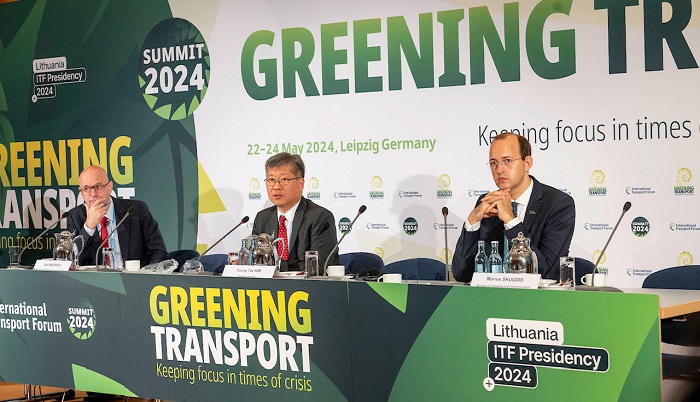
Leipzig: Surrounded by green trees and a beautiful lake, Leipziger Messe GmbH (CCL), the venue of the International Transport Forum (ITF) Annual Summit 2024, provides a perfect setting for global leaders to discuss greening transport. Ministers from the 66 member countries of the ITF and scores of journalists from across the world have gathered for the Annual Summit in Leipzig, Germany, which got underway on Wednesday under the Presidency of Lithuania.
With hundreds of expert speakers invited to discuss challenging subjects like environmental sustainability and promoting greener transport, the three-day summit’s main theme is “Greening Transport: Keeping Focus in Times of Crisis.”
Experts and government stakeholders are expected to discuss transport’s role in environmental sustainability and assess the impacts of climate, health, and geopolitical crises on the sector.
Transport ministers and top officials from member nations will hold closed-door talks and open sessions on how to maintain a long-term policy focus amid these crises, leveraging opportunities to promote a greener and more resilient transport sector.
More than 70 sessions and side events will explore various aspects of the theme of greening transport, from inclusion and accessibility to cleaner and automated vehicles and digital innovation. Ministerial-level delegations from over 40 countries, together with representatives from international organisations, corporations, and non-governmental organisations, have also arrived to attend the event, with ITF officials suggesting that around 1,200 participants will be at the summit.
Oman among three nations all set to be granted ITF membership
In a world facing fragmentation, the ITF’s highest decision-making body, the Council of Ministers of Transport, will consider new membership requests from three countries during its session on Thursday, according to Young Tae Kim, Secretary-General of the International Transport Forum.
In his exclusive remarks to Times of Oman on Wednesday on the sidelines of the opening press briefing, South Korea’s Kim said: “In all likelihood, Oman along with Saudi Arabia and Dominican Republic, will be officially granted membership to the International Transport Forum.
“The three nations have applied for membership, and the council will approve the membership requests tomorrow. A formal announcement will only be made after the opening council session is over. With the inclusion of three more countries, the ITF family will grow to 69 member countries.”
On Wednesday, the summit’s opening press conference was addressed by Marius Skuodis, Lithuania’s Minister of Transport and Communication, who highlighted the challenges the world is facing and ITF’s active role in addressing these issues. The summit will also hold talks on significant issues: climate change, inclusive transport, and strengthening supply chains.
Among the other topics that are going to be discussed in detail over the three days is uncovering the global trade in used vehicles following a recent ITF report that compiled data on global flows of used-vehicle exports.
At the summit, the ITF is expected to launch a Used Vehicle Dashboard, which allows one to explore statistics and compare data on the international import and export of used passenger cars.
The growing presence of e-scooters and their safety is another topic ITF experts spoke on the opening day.
Philippe Crist, Advisor-Innovation and Foresight at ITF said: “Micromobility is becoming safer, but governments should enforce better policies on reduced speeds for e-scooters and provide safe infrastructure for the users. Managing speed, providing training to road users and enforcing rules are primary steps to ensure that e-scooters and other micromobility devices are a safer mode of transportation,” he added.
Road safety: Safe system tool
Another key element at the summit will be the demonstration of the Safe System tool. The Safe System approach to road safety aims to save lives and prevent serious injuries by tackling all aspects of road use and design. The ITF’s web-based Safe System tool is meant for countries, cities, companies, or projects working to improve road safety.
Carbon emission reduction
With transport responsible for 30% of global CO2 emissions and climate change leading to extreme weather events, the urgency for carbon emission reduction is pivotal. The Covid-19 pandemic and geopolitical conflicts have disrupted the transport sector and supply chains, contributing to an energy crisis and environmental challenges.
At the ongoing summit, decision-makers are discussing ways to maintain a long-term policy focus amid these crises, leveraging opportunities like cleaner and automated vehicles and digital innovation to promote a greener and more resilient transport sector. Simultaneously, evaluating the environmental risks associated with increased digitalisation is another increasingly crucial issue that will be discussed.